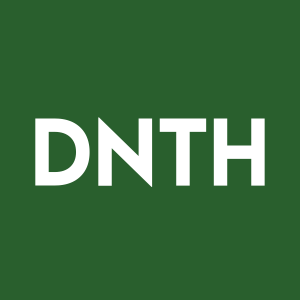Dianthus Therapeutics Announces FDA Clearance to Initiate Phase 2 Trial of DNTH103 in Multifocal Motor Neuropathy (MMN)
Rhea-AI Summary
Dianthus Therapeutics has received FDA clearance to start a Phase 2 trial for DNTH103 in treating Multifocal Motor Neuropathy (MMN). This trial, named the MoMeNtum study, will assess the safety, tolerability, and efficacy of DNTH103 in 36 patients globally. The trial will follow a randomized, double-blind, placebo-controlled design, with patients receiving subcutaneous injections every two weeks for 17 weeks, followed by a 52-week open-label extension. Top-line results are expected in the second half of 2026. DNTH103, a potent C1s inhibitor, aims to offer a more convenient treatment option than current therapies. Dianthus is also building a neuromuscular franchise with planned trials in generalized Myasthenia Gravis and Chronic Inflammatory Demyelinating Polyneuropathy in 2024.
Positive
- FDA clearance to initiate Phase 2 trial for DNTH103 in MMN.
- Potential best-in-class C1s inhibitor designed for self-administration.
- MoMeNtum trial to evaluate safety, tolerability, and efficacy in 36 MMN patients.
- DNTH103 aims to offer a more convenient treatment option than current therapies.
- Building a neuromuscular franchise with additional planned trials in 2024.
- Top-line results from the MoMeNtum trial anticipated in 2H 2026.
Negative
- Top-line results for the MoMeNtum trial will not be available until the second half of 2026, indicating a long wait period for potential market entry.
- The trial's primary endpoint focuses on safety and tolerability, which may delay efficacy-related insights.
News Market Reaction
On the day this news was published, DNTH gained 5.01%, reflecting a notable positive market reaction.
Data tracked by StockTitan Argus on the day of publication.
Top-line results from Phase 2 MoMeNtum trial in Multifocal Motor Neuropathy anticipated in 2H 2026
Building a neuromuscular franchise with DNTH103 following the initiation of the Phase 2 MaGic trial in generalized Myasthenia Gravis (gMG) in 1Q’24 and planned initiation of a Phase 2 trial in Chronic Inflammatory Demyelinating Polyneuropathy (CIDP) in 2H’24
Recently disclosed head-to-head affinity and PD potency data reinforce DNTH103 is a highly potent, potential best-in-class active C1s inhibitor designed for self-administration in a low-volume, subcutaneous autoinjector once every two weeks
NEW YORK and WALTHAM, Mass., June 12, 2024 (GLOBE NEWSWIRE) -- Dianthus Therapeutics, Inc. (Nasdaq: DNTH), a clinical-stage biotechnology company dedicated to advancing the next generation of antibody complement therapeutics to treat severe autoimmune diseases, today announced U.S. Food and Drug Administration (FDA) clearance of its Phase 2 Investigational New Drug (IND) application for the MoMeNtum trial of DNTH103 in patients with Multifocal Motor Neuropathy (MMN).
“Pre-clinical and clinical evidence support the classical pathway’s role in the pathology seen in MMN,” said Simrat Randhawa, MD, Chief Medical Officer of Dianthus Therapeutics. “DNTH103 is a potent and highly selective inhibitor of active C1s resulting in classical pathway inhibition, without inhibiting the alternative and lectin pathways that are critical in the defense against infection. The Dianthus medical team and our MMN steering committee are excited to investigate the potential benefits DNTH103 may bring to MMN patients.”
The MoMeNtum trial is a global, randomized, double-blind, placebo-controlled Phase 2 study designed to evaluate the safety, tolerability, and efficacy of DNTH103 in 36 patients with MMN. Following determination of Ig dependency and responsiveness, patients will be randomized to receive placebo or DNTH103 administered subcutaneously (S.C.) every two weeks (Q2W). The initial S.C. treatment duration is expected to be 17 weeks followed by a 52-week open label extension. The primary endpoint of this study is safety and tolerability. Secondary endpoints include time to IVIg retreatment, time to relapse, and assessments of muscle and grip strength. Initial top-line results from this trial are anticipated to be available in the second half of 2026.
“There is a significant unmet medical need for a targeted biologic to treat patients living with MMN,” said Hans Katzberg, MD, MSc, FRCPC, Associate Professor of Neurology, University of Toronto, Prosserman Centre of Neuromuscular Disease. “Today, treatments for MMN are limited to intravenous or subcutaneous infusions of Ig, which can be both inconvenient for patients and difficult to tolerate. Treating MMN with an active C1s inhibitor, like DNTH103, has the potential to transform the lives of these patients.”
About DNTH103
DNTH103 is an investigational, clinical-stage, potent monoclonal antibody engineered to selectively target the classical pathway by inhibiting only the active form of the C1s protein, a clinically validated complement target. DNTH103 is enhanced with YTE half-life extension technology designed to enable a more convenient subcutaneous, self-administered injection dosed as infrequently as once every two weeks. Additionally, selective inhibition of the classical complement pathway may lower patient risk of infection from encapsulated bacteria by preserving immune activity of the lectin and alternative pathways. As the classical pathway plays a significant role in disease pathology, DNTH103 has the potential to be a best-in-class pipeline-in-a-product across a range of autoimmune disorders with high unmet need. Dianthus is building a neuromuscular franchise with DNTH103 following the initiation of the Phase 2 MaGic trial in generalized Myasthenia Gravis in 1Q’24, regulatory clearance for Multifocal Motor Neuropathy in 2Q’24, and planned initiation of a Phase 2 trial in Chronic Inflammatory Demyelinating Polyneuropathy in 2H’24.
DNTH103 is an investigational agent that is not approved as a therapy in any indication in any jurisdiction worldwide.
About Dianthus Therapeutics
Dianthus Therapeutics is a clinical-stage biotechnology company dedicated to designing and delivering novel, best-in-class monoclonal antibodies with improved selectivity and potency. Based in New York City and Waltham, Mass., Dianthus is comprised of an experienced team of biotech and pharma executives who are leading the development of next-generation antibody complement therapeutics, aiming to deliver transformative medicines for people living with severe autoimmune and inflammatory diseases.
To learn more, please visit www.dianthustx.com and follow us on LinkedIn.
Cautionary Statement Regarding Forward-Looking Statements
Certain statements in this press release, other than purely historical information, may constitute “forward-looking statements” within the meaning of the federal securities laws, including for purposes of the safe harbor provisions under the United States Private Securities Litigation Reform Act of 1995, express or implied statements regarding future plans and prospects, including statements regarding the expectations or plans for discovery, preclinical studies, clinical trials and research and development programs, in particular with respect to DNTH103, and any developments or results in connection therewith, including the target product profile of DNTH103; the anticipated timing of the initiation and results from those studies and trials; expectations regarding the time period over which the Company’s capital resources are expected to be sufficient to fund its anticipated operations; and expectations regarding the market and potential opportunities for complement therapies, in particular with respect to DNTH103. The words “opportunity,” “potential,” “milestones,” “runway,” “will,” “anticipate,” “achieve,” “near-term,” “catalysts,” “pursue,” “pipeline,” “believe,” continue,” “could,” “estimate,” “expect,” “ intend,” “may,” “might,” “plan,” “possible,” “predict,” “project,” “ should,” “strive,” “would,” “aim,” “target,” “commit,” and similar expressions (including the negatives of these terms or variations of them) generally identify forward-looking statements, but the absence of these words does not mean that statement is not forward looking.
Actual results could differ materially from those included in the forward-looking statements due to various factors, risks and uncertainties, including, but not limited to, that preclinical testing of DNTH103 and data from clinical trials may not be predictive of the results or success of ongoing or later clinical trials, that the development of DNTH103 or the Company's other compounds may take longer and/or cost more than planned, that the Company may be unable to successfully complete the clinical development of the Company’s compounds, that the Company may be delayed in initiating, enrolling or completing its planned clinical trials, and that the Company's compounds may not receive regulatory approval or become commercially successful products. These and other risks and uncertainties are identified under the heading "Risk Factors" included in the Company’s Annual Report on Form 10-K for the period ended December 31, 2023, and other filings that the Company has made and may make with the SEC in the future. Nothing in this press release should be regarded as a representation by any person that the forward-looking statements set forth herein will be achieved or that any of the contemplated results of such forward-looking statements will be achieved.
The forward-looking statements in this press release speak only as of the date they are made and are qualified in their entirety by reference to the cautionary statements herein. Dianthus undertakes no obligation to publicly update or revise any forward-looking statement, whether as a result of new information, future events or otherwise, except as required by law.
Contact
Jennifer Davis Ruff
Dianthus Therapeutics
jdavisruff@dianthustx.com








